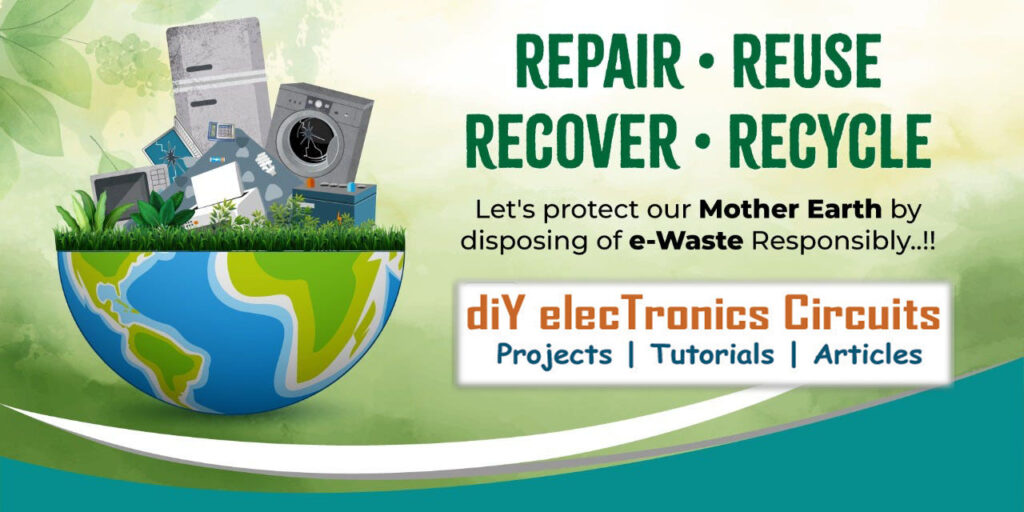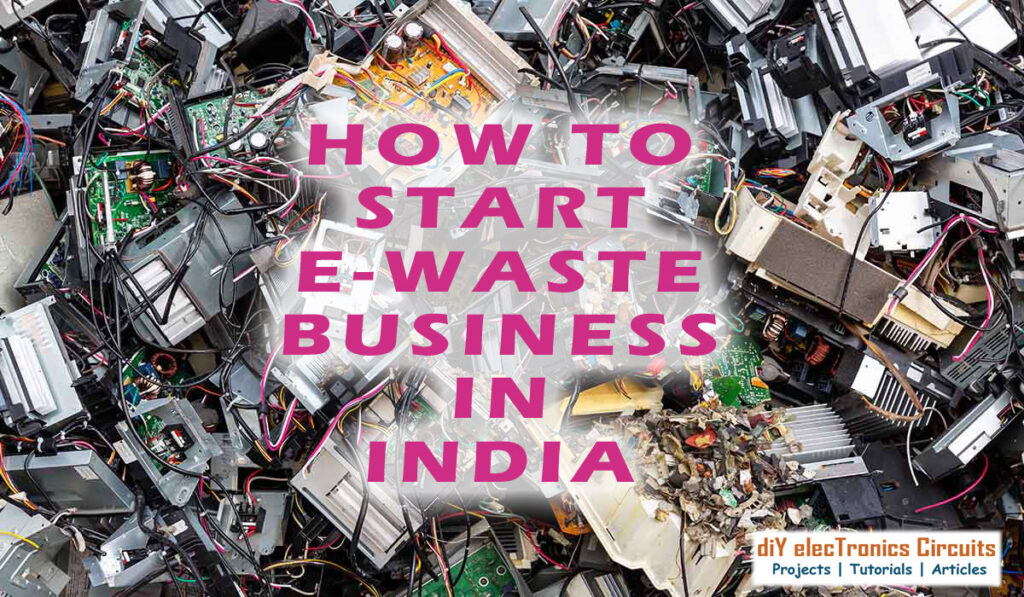E-waste, short for Electronic Waste, refers to old or discarded electronic devices like old phones, computers, TVs, and other gadgets. When people throw away these devices, they can harm the environment because they contain materials that are not good for nature, like metals and chemicals. Recycling e-waste is important to protect our planet.

How to Start Profitable E-Waste Recycling Business in India?
If you are searching for Best Business Idea and want Earn handsome Profit, than E-Waste management is one of them. Before starting this business, go through this Article and get depth knowledge about the pros and cons of the Business. E-waste management is the process of handling, collecting, recycling, and disposing of old or unwanted electronic devices, like phones and computers, in a safe and environmentally-friendly way. The goal is to make sure these gadgets don’t harm our environment and that useful materials in them are reused or recycled.
eDITORS vIEW
Hello Friends, In Past few years, there is huge adoption of Electronic Items in India such as Smart Phones, Laptops, Digital Watches, LED TV’s, IT Products, Consumer Electronics Products and many more. Easy Finance Options in India help people to more Buy Electronics Items, if also it is not necessary. Average People in India change there personal Gadgets such as Phones in every 8 to 10 Months. Now a Days people are not interested to Repair the Electronics goods rather they are choosing to change the gadget or product with New One. This Electronics replacement process create a lots of E-Waste in every house and without proper processing of this Items create a Health Hazard.
While E-waste recycling is a major source of income for many people in India, it also creates numerous health and environmental risks. More than 90% of India’s e-waste is illegally recycled by informal waste pickers called kabadiwalas / raddiwalas (scrap traders). Recyclers often rely on basic recycling techniques that can release toxic pollutants into the surrounding area. The release of toxic pollutants associated with crude e-waste recycling can have far reaching, irreversible consequences in the Environment. If proper Recycling, Reducing or Reusing Technique is used with E-Waste than a Big Profitable Business can be made in India.
Global Rank of India in E-Waste
According to the UN Global E-Waste Monitor Report, India is the world’s Third Largest generator of E-waste, behind only China and the United States. In 2019, India generated 2.4 kg of e-waste per capita, which is much lower than the global average of 7.3 kg per capita. India’s e-waste volume has increased significantly to 1.6 million tonnes in 2021-2022. In addition to generating e-waste, India also imports an undisclosed amount from other countries. Mumbai is the top city in India for generating e-waste, followed by Delhi, Bengaluru, Chennai, Kolkata, Ahmedabad, Hyderabad, Pune, Surat, and Nagpur.
How E-Waste is a Business Opportunity?
E-waste, while posing environmental challenges, also presents numerous business opportunities for those willing to innovate and provide solutions in this space.
Companies can specialize in recycling electronic waste, extracting valuable metals and components for reuse, or refurbishing old devices to make them functional again for resale or donation. There’s also a growing demand for Eco-friendly disposal solutions that ensure electronic waste is managed in an environmentally responsible manner. Some businesses focus on extracting and reselling valuable components from discarded electronics, such as rare metals. Given the increasing concerns about data security, there’s a niche for services that securely wipe or destroy data from old devices.
Additionally, efficient collection, transportation, and logistics services for e-waste are needed, especially in areas with limited infrastructure. As regulations around e-waste management become stricter, consultants and advisors who can guide businesses on sustainable and compliant practices are also in demand.
Reasons of Massive E-Waste Generation
Risks related to E-Waste Management
Processing E-Waste to generate valuable Raw Materials, involves a great risk of health hazard. Some of the key points are described below:
-
Environmental Pollution: If not managed properly, e-waste can release harmful chemicals and metals into the environment, contaminating soil, water, and air. E-waste contains many materials, such as lead, mercury, per- and polyfluoroalkyl substances (PFAS), brominated flame retardants (BFR), chlorofluorocarbons (CFC), hydrochlorofluorocarbons (HCFC), and persistent organic pollutants . When e-waste is not recycled, these chemicals contaminate landfills, adversely impacting the water supply through leachate, and polluting the land. Communities located near landfills are particularly susceptible to chemical exposures resulting from improper e-waste disposal.
- Health Concerns: Direct exposure to hazardous materials in e-waste, such as lead, mercury, and brominated flame retardants, can cause health problems like respiratory issues, skin disorders, and damage to the nervous system.
- Improper Disposal: Dumping e-waste in landfills can lead to leaching of toxic substances into groundwater, affecting both human health and local ecosystems.
- Data Security Risks: Discarded electronic devices might still contain personal or sensitive data. Improper disposal can lead to data breaches or unauthorized access to personal information.
- Resource Waste: Without effective recycling processes, valuable materials in e-waste are not recovered and reused, leading to unnecessary depletion of natural resources.
Proper e-waste management practices are essential to mitigate these risks and ensure the protection of both the environment and human health.
Types of Waste Management Method
In e-waste management, various methods are employed to handle and process electronic waste based on Reduce, Reuse and Recycle method. Some of the key waste management methods used in e-waste include:

- Refurbishment and Reuse: This involves Repairing and Restoring old electronic devices to make them functional again and Resale them as Good as New or Reuse them.
- Reduce and Recycling: E-waste recycling focuses on extracting valuable materials like metals (e.g., gold, silver, copper) and plastics from discarded electronic devices. These materials can then be reused as Raw materials for new products manufacturing .
- Material Recovery: Before recycling, e-waste is often processed to recover specific materials. For instance, magnets can be used to separate ferrous metals, and various techniques can be applied to extract precious metals.
- Secure Data Destruction: Given the importance of data security, methods are employed to ensure that all data on discarded devices is completely wiped or destroyed to prevent unauthorized access.
- Landfill and Incineration: While not the most environmentally friendly, in some cases, e-waste that cannot be recycled or refurbished might end up in landfills or undergo controlled incineration to reduce its volume and potential environmental impact.
Each method has its advantages and challenges, and the choice of method often depends on factors like the type of e-waste, available technology, regulatory environment, and economic considerations.
Business Ideas Related to E-Waste
These e-waste business ideas offer opportunities to address environmental challenges, promote circular economy principles, and tap into the growing demand for sustainable and responsible electronic waste management solutions. By leveraging creativity, innovation, and expertise, entrepreneurs can establish successful ventures that contribute to a more sustainable future.
- Extracting Copper and Aluminium from Wires and Motors and use it again as Raw Materials
- Refurbishing & Resale – Phones and Gadgets
- Refurbishing & Sale – IT Products and Resale – such as Hardisk, Supplies, Motherboards, CCTV etc
- Refurbishing & Sale – Electronics Goods such as TV, Fridge, Washing and other Consumer Electronics
- Extracting Precious Metals from Components such as Gold, Silver, Platinum from Processor and further used as Raw Materials.
- Lithium Ion Battery Recycling – Of Electric Vehicles, Mobile Phone Batteries, Laptop Batteries, etc
- Up-cycle -Design and manufacture accessories, jewelry, or fashion items using recycled electronic materials.
- Collaborate with artists and designers to create unique art pieces, furniture, or decorative items using recycled electronic components.
Top Businesses in E-Waste Management
There are multiple E-Waste management companies in India, that are processing in large scale . We have listed the top pioneers in E-Waste management
- Cashify.in – Cashify.in is an e-commerce platform for reselling used electronic gadgets.
- Attero Recycling – Attero is an integrated end to end electronics asset management company aiming at increasing value for all electronic inventories.
- Namo E-Waste – Namo ewaste is a pioneer in asset management and electronics recycling, with its top of the line services to efficiently manage, dispose and recycle discarded electronic items.
- Tvarita Phones -Tvarita Phones is into refurbishing, repair, and replacement of premium smartphones in India.
- E-scrappy Recyclers – E-scrappy Recyclers propose a progressive approach to the disposal of IT Assets and End of Life Electronics with Zero Landfill using an eco-friendly recycling methodology for all Electronic and Electrical Equipments.
How to Start E-Waste Management Business in India
Starting E-Waste management Business in India on Year 2024-2025 will be very profitable because growth in IT and Tech Sector is very fast and New Devices and gadgets are upgrading on daily basis, that further leads to generation of lots of E-Waste . The exact investment required for e-waste management in India will depend on the specific business model, geographic location, target market, and strategic objectives. Conducting a comprehensive feasibility study and business plan can help you assess the potential costs, evaluate financing options, and develop a realistic budget for your e-waste management venture.

However, here’s a general breakdown of potential investment areas and associated costs:
Capital Investment
Generally Capital Required to Start any Business depends upon the Geographic Area, Machinery and Scale of the Business. Basically an e-waste recycling business in India requires an investment of Rs. 500,000–800,000/-
E-Waste Collection Team and Resource
Developing a collection network and establishing logistics infrastructure requires investment in vehicles, storage facilities, and transportation systems to facilitate the efficient collection and movement of e-waste. Daily Pick Up agents are required to Hired for collection of E-Waste goods across the cities.
Land and Building
Acquiring or leasing land and constructing or setting up a facility compliant with environmental and safety standards can be a significant initial investment.
Machinery
Purchasing or leasing specialized equipment and machinery for e-waste collection, segregation, processing, and recycling is essential. This includes shredders, separators, crushers, and other relevant technologies.
Documents Required
- GST Certificate
- Rent Agreement and NOC
- Trade License
- Plan Layout
- Applicant Details along with Address Proof
License and Permission
Government permissions and licenses is needed to start an e-waste recycling business. The basic process, however, remain the same across states. Common Steps needed to follow while starting E-Waste business. Familiarize yourself with the E-Waste (Management) Rules, 2016, and any subsequent amendments or regulations related to e-waste management in India. Obtain necessary licenses and permits from relevant authorities, such as the Central Pollution Control Board (CPCB) and State Pollution Control Boards (SPCBs).
- Register at the Udyog Aadhaar MSME status to begin your e-waste recycling business. You’ll be able to do that online.
- Go to the State PCB (Pollution Control Board) and ask for permission to start an e-waste business. To apply for approval from the PCB, you need to submit several statutory documents.
- You will need the necessary approval from the Ministry of the Environment if you wish to import e-scraps as part of your e-waste recycling business plan. You will also be given an extensive protocol by the Central Excise and Customs Board

